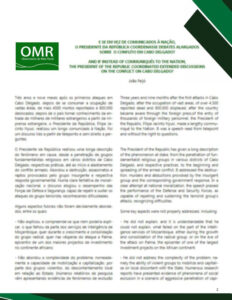Autor: João Feijó
RESUMO:
A ofensiva ruandesa nas matas de Macomia permitiu a realização de campanha política e eleições nas vilas sede distritais do Nordeste de Cabo Delgado. Contudo, na sequência dos conflitos pós-eleitorais, verificou-se um agravamento da conflitualidade na província. A partir de Outubro assistiu-se a uma contestação popular nas zonas de concentração de indústria extractiva e nos principais centros urbanos do Sul de Cabo Delgado, mas também a uma recuperação da iniciativa jihadista, que recuperou a iniciativa militar. A Norte de Nampula emergiram movimentos nhaparama que se confrontam directamente com o Estado. Os efeitos destrutivos do ciclone Chido aumentaram ainda mais a pressão sobre organizações humanitárias, agravando as fragilidades estruturais existentes na província, ao nível da prestação de serviços de saúde, educação, apoio humanitário e a actividades económicas.
SUMMARY:
The Rwandan offensive in the forests of Macomia made it possible to hold political campaigns and elections in the district headquarters of north-eastern Cabo Delgado. However, as a result of the post-election protests, the conflict tensions in the province worsened. Since October, there have been popular protests in the areas where the extractive industries are concentrated and in the main urban centres in the south of Cabo Delgado, but also a resurgence of the jihadist initiative, that recovered the military initiative. In the north of Nampula, nhaparama movements have emerged that are in direct confrontation with the State. The destructive effects of Cyclone Chido have further increased the pressure on humanitarian organisations, aggravating the existing structural weaknesses in the province in terms of the provision of health services, education, humanitarian assistance, and economic activities.
Janeiro de 2024







